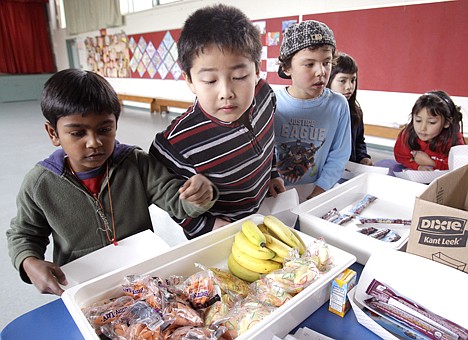School lunch bill targets child obesity
WASHINGTON (AP) - More children would eat lunches and dinners at school under legislation passed Thursday by the House and sent to the president, part of first lady Michelle Obama's campaign to end childhood hunger and fight childhood obesity.
The $4.5 billion bill approved by the House 264-157 would also try to cut down on greasy foods and extra calories by giving the government power to decide what kinds of foods may be sold in vending machines and lunch lines. The bill could even limit frequent school bake sales and fundraisers that give kids extra chances to eat brownies and pizza.
The first lady said in a statement after the vote that she was "thrilled" about House passage. She called the bill "a groundbreaking piece of bipartisan legislation that will significantly improve the quality of meals that children receive at school."
Republicans said the bill is too expensive and an example of government overreach. Even former Alaska Gov. Sarah Palin has weighed in, bringing cookies to a speech at a Pennsylvania school last month and calling efforts to limit junk food in schools a "nanny state run amok."
Democrats said the legislation is needed to stem rising health care costs due to expanding American waistlines and to feed hungry children in tough economic times.
The new nutrition standards would be written by the Agriculture Department, which would decide which kinds of foods may be sold and what ingredients can be used on school lunch lines and in vending machines.
The new standards would likely keep popular foods like hamburgers and pizza in school cafeterias but make them healthier, using leaner meat or whole wheat crust, for example.
Vending machines could be stocked with less candy and fewer high-calorie drinks.
Bake sales and other school sponsored fundraisers that sell unhealthy foods could be limited under the legislation, which only allows them if they are infrequent. The Agriculture Department would determine how often they could be held. Public health advocates pushed for the language, saying they are concerned about daily or weekly fundraisers that allow children to substitute junk food for a healthier meal.
The bill would increase eligibility and accessibility for school lunches by using Medicaid and census data and provide money to serve more than 20 million additional after-school meals annually in all 50 states. Most states now only serve after-school snacks.
The legislation would increase the amount of money schools are reimbursed for free lunches by 6 cents a meal, a priority for schools that say they don't have enough money to serve the meals.
Some public school organizations have criticized the bill, saying they are concerned it will set new requirements without providing enough money to carry them out.
"This will just add a new burden for schools to pay for another unfunded mandate at a time when there are critical budget shortfalls," said Anne L. Bryant, executive director of the National School Boards Association.
The Senate passed the legislation in August. Republicans attempted to send the bill back to the Senate on Wednesday - instead of straight to President Barack Obama - by using a procedural maneuver to try and amend it with language that would require background checks for child care workers.
Democrats said the amendment was an attempt to kill the bill in the last few weeks of the congressional session because there would be no time for the Senate to pass it again and send it back to the House. They avoided the Senate detour and gave members of their party political cover by passing the background checks in a separate bill Thursday.
The child nutrition bill stalled in September when some liberal Democrats opposed it because it is partially paid for with $2.2 billion in future dollars for food stamps. But those Democrats dropped their opposition after Republicans made large gains in the November elections and the White House promised to find a way to restore the money.
Agriculture Secretary Tom Vilsack said the measure gives USDA the chance to make significant changes to school lunch programs for the first time in more than 30 years.
"Our national security, economic competitiveness and health and wellness of our children will improve as a result of the action Congress took today," Vilsack said.

